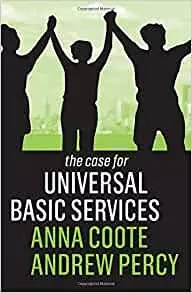The Case for Universal Basic Services
Anna Coote and Andrew Percy
"The Case for UBS", Anna Coote and Andrew Percy
A poorly argued case for UBS
The argument for Universal Basic Services (UBS) advanced by Anna Coote and Andrew Percy runs
- extensive poverty and deprivation exist in developed societies (p10)
- meeting need by ‘collective ideal’ is preferable to ‘individual choice and market competition’ (p5)
- UBS should extend from health and education to care, housing, transport, and Internet services (p5)
- UBS should deliver ‘sufficiency and sustainability’ (p5)
- UBS should be ‘participative, controlled by the people who use them’ (p5)
- the possible alternative of Universal Basic Income (UBI) cannot deliver (p7, 51-56), and is not even compatible with UBS since ‘the two conflict ideologically’ (p56).
It’s this ideological agenda which drives Coote and Percy to UBS. They write about ‘the danger of elevating choice and competition above collective responsibility’ (p58). They claim that ‘market-based systems are less effective than collective services’ (p55). They see a market economy as essentially exploitative (p25,55).
It’s a naïve claim that humanity is bifurcated into an exploitative inefficient private sector, and a benign efficient public sector. The same human beings populate both sectors, with the same set of moral strengths and weaknesses. A better model therefore operates a symbiosis between the two. Public sector organisations can work well and deliver efficiently, but they can also perform badly, and show little regard to those they claim to serve. Local government for example has proved poor at operating care homes, the majority of which were of low standard and have had to close. Local government costs are often far higher than private sector costs, due to high overhead charges levied. In the city I live in, the local Council has proved sadly incapable of delivering a digital residents’ car parking scheme, a children’s playground etc. A monopolist Council faces less sanction from its customers than a competitive private provider. Even in health provision, the private sector plays an important role in development and delivery of technology like MRI scanners and pharmaceuticals, whilst the public sector has not excelled in provision of adequate numbers of nurses.
Health and education are widely accepted as core UBS services. They are both fundamentally life transforming and enabling, but also very expensive. Similar claims can be made for care and housing, but hardly for transport and Internet services. Coote and Percy offer no participative endorsement for their selection of these projects as UBS. They did not fare well when included in the UK Labour party’s election manifesto. Food and clothing will rate as essentials for most people. Coote and Percy also don’t address the question of whether people feel greater dignity in exercising personal responsibility in arranging their own transport, Internet provider etc. Neither do they deal with the threat of an overwhelming, unresponsive, and ultimately repressive state. Having proposed universality for UBS, they then struggle with questions of eligibility (p29).
Their critique of UBI is insufficiently considered, and mainly relies on berating UBI as a market philosophy. This fails to acknowledge the wide set of factors which make the case for UBI, one of which is the failure of a market economy to deliver necessary income, as technology erodes wage within production. Contrary to their claim, UBI does have ecological credentials by breaking the link between living income and more employment, wage and output. UBI gives people lifestyle choice, which Coote and Percy appear determined to deny.
The book is available here.
Geoff Crocker
Editor ‘The Case for Universal Basic Income’
www.ubi.org

